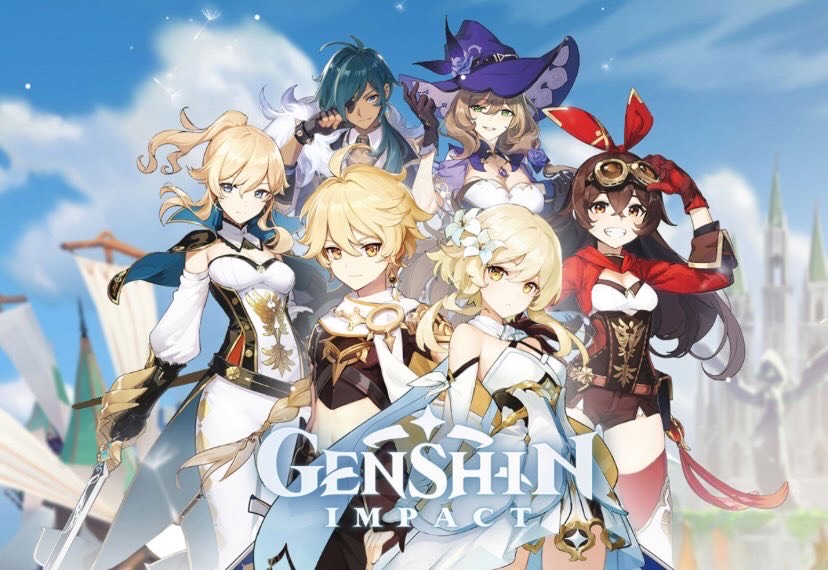‘Genshin Impact’s’ Latest Updates Roll Out Cultural Appropriation
October 6, 2022
With the ever-expanding storyline of “Genshin Impact” comes a brand new area to explore. Unfortunately, it also brings with it plenty of distasteful ties to a specific type of cultural appropriation known as “orientalism.’
In late August, the popular role-playing game released its massive 3.0 update, featuring a new region known as Sumeru. This new land is a wide breadth of lush green forests and hills, with plenty of new characters and weapons to use and adventures to be had. While at first, the region seems like a beautiful new landscape to play in, Sumeru is essentially a region based entirely on “orientalist” stereotypes, from the characters to the whole region itself.
“Orientalism” is a skewed perception of Middle Eastern or Asian cultures made to cater to a more Western perception of the region. Think of movies like “Indiana Jones” and “Aladdin;” these movies make the region out to be something exotic, fanciful, or in some cases, lesser or completely evil compared to the West. In media with Middle Eastern or South Asian inspiration, it is common to watch people make gross generalizations of regions, cherry-pick bits and pieces of cultures, or include possibly harmful stereotypes for characters.
When people speak out about orientalism, they are usually shunned by those who don’t view it as an issue. These people have given into these warped versions of what the cultures truly are. Generalization is one of the more common ways orientalism is portrayed in media, creating a blurred mixture of cultures that may not have too much in common with the reality of these complex and diverse parts of the world.
Sumeru is a blend of several different cultures (namely Egyptian, Indian, and Arab) that are all wildly different from each other. The game’s other three regions, Mondstat, Liyue, and Inazuma, are based in Germany, China, and Japan respectively, while Sumeru is much more generalized.
The “Genshin Impact” fanbase is quick to produce leaks of unreleased content, and before the region even got released, people were very disappointed with the appearances of the characters. These fans found it disrespectful to the region it was based on for almost all of the new characters to have pale skin, similar to most of the other already released characters based in European and other Southeast Asian countries. The only two characters with darker skin in the game are described as “exotic” or “scary,” making it seem like darker skin on characters is treated as less of a physical trait and more of a character trait.
One of the new upcoming characters, Dori, is a money-hungry girl that runs her own shop known as “Dori’s Divine Bazaar.” Her personality could be perceived as a harmful Middle Eastern stereotype that paints the real-life region in a bad light. This stereotype has deep roots in racism and prejudice, dating back to the early 1900s when poor South Asian immigrants had to take jobs that white people didn’t want and struggled to fit into Western society. Dori has a main skill in which she rides on and attacks a jinn named Jinni. If the word “jinn” sounds familiar, you’ve probably recognized the more common anglicized spelling as “genie.” One outraged Twitter user claimed it is Islamophobic and extremely disrespectful for her to be riding on a sacred figure “like an animal.” This sparked a lot of controversy from both sides of the issue, but the original poster was bombarded by replies saying that nowhere in Islam mythology is jinn considered a holy being. Instead, they are more similar to fairies rather than sacred figures.
Some fans have taken these issues and raised them to the extreme, going so far as to harass Dori’s English voice actress, Anjali Kunapaneni, to the point where she had to close her private messages and make a statement on Twitter about the situation. Kunapaneni was not the only voice actor who had to speak out based on the complaints people had about the new update.
On a recent live stream, Zach Aguilar and Elliot Gindi, the voice actors of the male protagonist and a new Sumeru character named Tighnari respectively, discussed a recent game trailer in which they pronounced Tighnari’s name incorrectly (think Tie-nari- the proper Arabic pronunciation is closer to Tug-nari). They revealed that they were both directed to pronounce it incorrectly on purpose since the developers told the voice actors that the original pronunciation would be too difficult for Western fans and they should pronounce it closer to how it’s read. The voice actors have been receiving unnecessary hate on the internet by a small group in the fanbase for just following the directions they were given.
“Genshin Impact” is far from the only game that has these issues: plenty of other overseas gacha games give their characters “oriental” or “exotic” costumes that are a mix of clothes of different cultures from the Middle East that get treated as some kind of mysterious aesthetic.
Recently, “Ensemble Stars,” a rhythm-based idol game, released an event titled “Orient,” in which the characters wore Middle Eastern-”themed” costumes. The text for the logo used a font that made the English title look like Arabic lettering, further pushing the Middle Eastern “aesthetic” in the event. Other gacha games, like “BanG Dream,” “Twisted Wonderland,” and “Project Sekai,” feature cards with their characters in these kinds of costumes, with the Middle Eastern-based regions being treated as grand, mysterious lands.
So, is there anything overseas fans can do about this problem? Unfortunately, not really.
Most of these gacha games have a much larger audience in their original countries of production, and people are more than willing to fork over hundreds of dollars just to get a new character or see their favorite character in a new outfit. Either way, most of these huge corporations don’t see the need to listen to their fans, since money will come in regardless of what they release.
Hoyoverse, the company behind “Genshin Impact,” says in its Terms of Service, “We cannot guarantee that you will not encounter content that you consider offensive or otherwise inappropriate, and we accept no liability for any failure to remove (or delay in removing) any such content.”
Is there anything fans can do now? Most of it boils down to just not spending money or rolling on the banners with these characters or costumes if you view them as offensive. There’s nothing we can really do on our side, and while it might be difficult to accept, it’s the nature of how these games make money and how they afford to keep their servers up and running.



